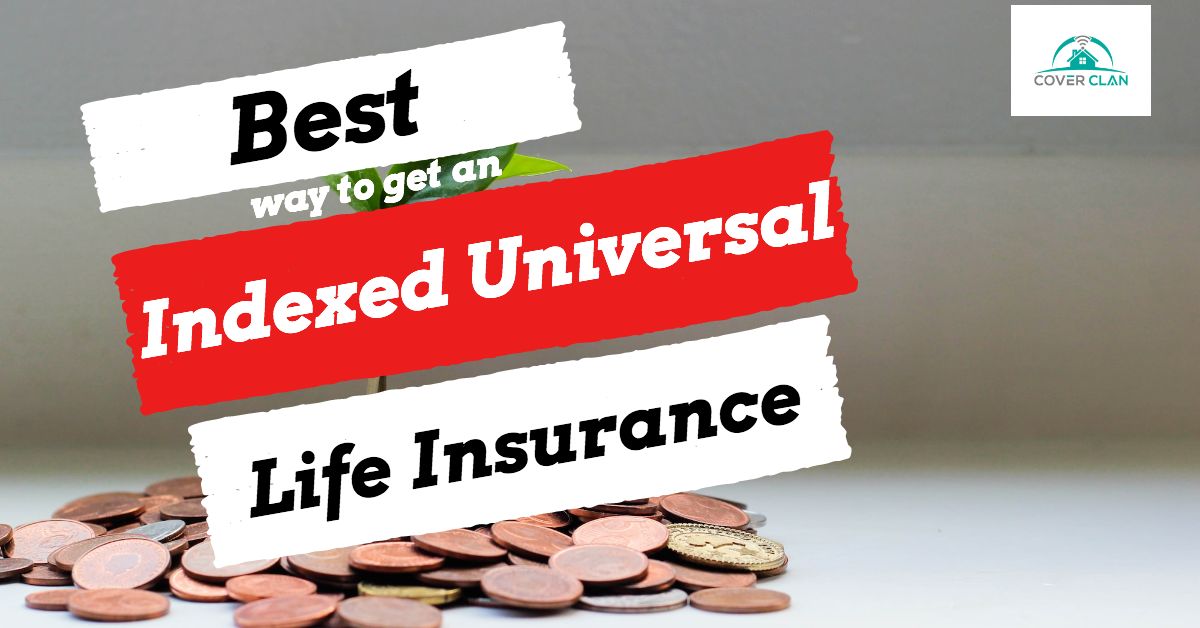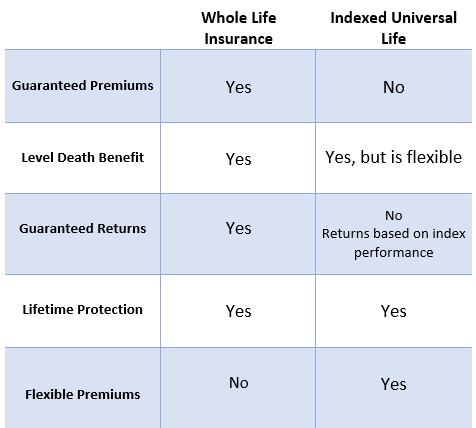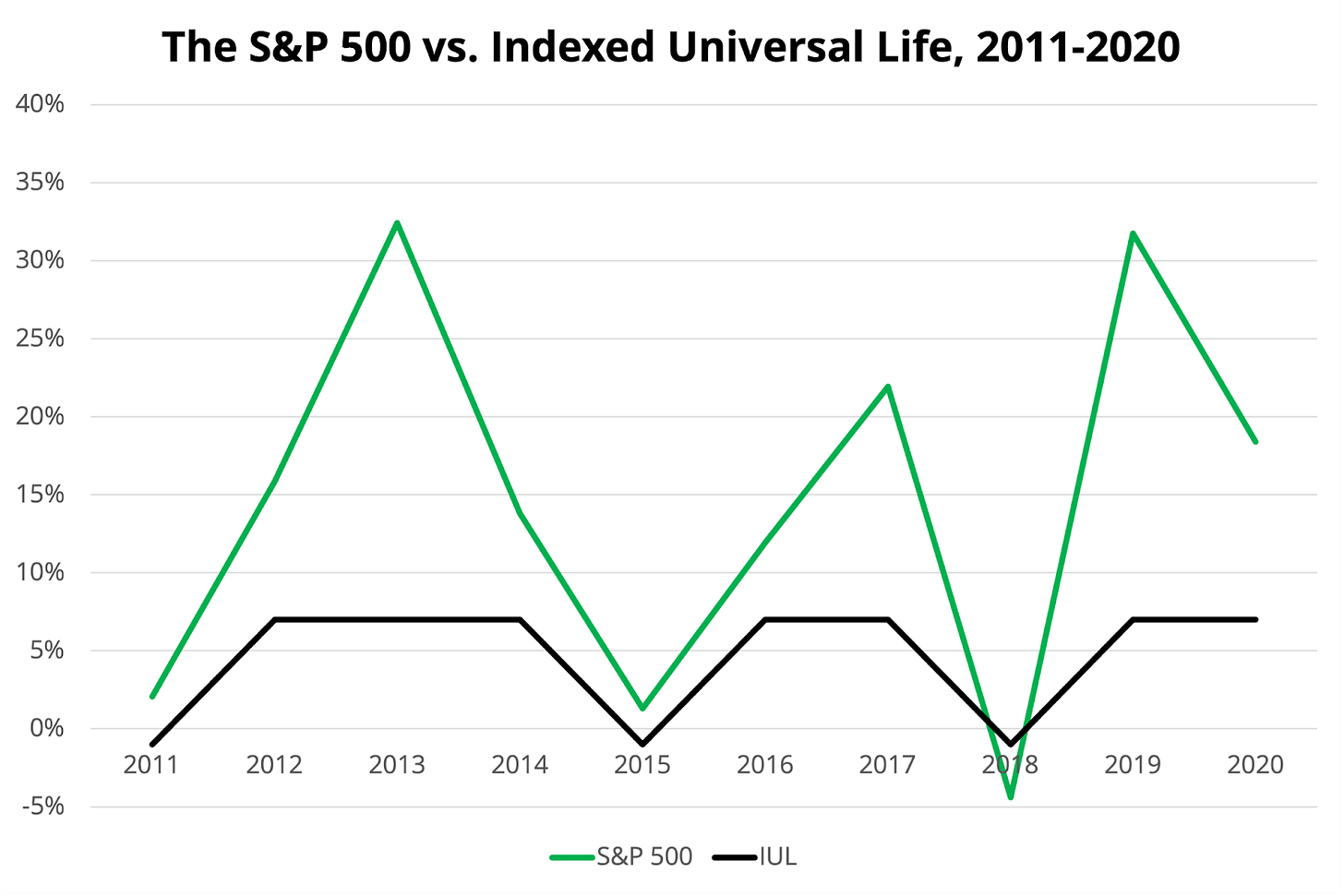All Categories
Featured
Table of Contents
1), usually in an effort to beat their group averages. This is a straw man disagreement, and one IUL people enjoy to make. Do they contrast the IUL to something like the Lead Total Amount Stock Exchange Fund Admiral Show no load, an expenditure proportion (ER) of 5 basis factors, a turnover proportion of 4.3%, and an outstanding tax-efficient document of distributions? No, they contrast it to some dreadful proactively managed fund with an 8% lots, a 2% EMERGENCY ROOM, an 80% turnover proportion, and a terrible record of temporary resources gain distributions.
Common funds usually make yearly taxed distributions to fund owners, even when the worth of their fund has dropped in value. Shared funds not only call for revenue coverage (and the resulting annual tax) when the mutual fund is rising in value, but can additionally impose income tax obligations in a year when the fund has dropped in worth.
That's not exactly how shared funds function. You can tax-manage the fund, harvesting losses and gains in order to reduce taxable distributions to the capitalists, but that isn't somehow mosting likely to alter the reported return of the fund. Just Bernie Madoff kinds can do that. IULs prevent myriad tax obligation traps. The ownership of mutual funds might require the mutual fund proprietor to pay projected taxes.

IULs are simple to place to ensure that, at the owner's fatality, the recipient is not subject to either revenue or estate taxes. The same tax reduction methods do not function virtually too with shared funds. There are countless, typically costly, tax obligation traps connected with the moment purchasing and marketing of common fund shares, traps that do not put on indexed life Insurance.
Chances aren't really high that you're going to be subject to the AMT as a result of your shared fund distributions if you aren't without them. The rest of this one is half-truths at ideal. For instance, while it is real that there is no revenue tax as a result of your beneficiaries when they inherit the profits of your IUL policy, it is also true that there is no income tax obligation because of your beneficiaries when they acquire a common fund in a taxable account from you.
Side Fund Life Insurance
There are better means to avoid estate tax problems than getting financial investments with reduced returns. Shared funds might cause earnings taxes of Social Protection benefits.

The growth within the IUL is tax-deferred and might be taken as tax obligation totally free earnings by means of lendings. The plan owner (vs. the shared fund supervisor) is in control of his/her reportable earnings, therefore allowing them to reduce or perhaps eliminate the tax of their Social Security advantages. This is wonderful.
Here's another marginal problem. It's true if you purchase a shared fund for say $10 per share right before the circulation date, and it disperses a $0.50 distribution, you are after that mosting likely to owe tax obligations (most likely 7-10 cents per share) in spite of the reality that you have not yet had any type of gains.
In the end, it's really regarding the after-tax return, not exactly how much you pay in tax obligations. You are mosting likely to pay even more in tax obligations by utilizing a taxable account than if you buy life insurance policy. You're additionally probably going to have even more money after paying those taxes. The record-keeping requirements for possessing mutual funds are substantially more intricate.
With an IUL, one's records are maintained by the insurer, copies of yearly declarations are mailed to the owner, and circulations (if any type of) are totaled and reported at year end. This is additionally sort of silly. Of program you need to maintain your tax obligation records in situation of an audit.
Term Life Insurance Vs Universal Life Insurance
Rarely a reason to acquire life insurance policy. Common funds are commonly component of a decedent's probated estate.
On top of that, they are subject to the delays and costs of probate. The proceeds of the IUL policy, on the various other hand, is constantly a non-probate circulation that passes beyond probate straight to one's called beneficiaries, and is consequently not subject to one's posthumous lenders, unwanted public disclosure, or similar hold-ups and prices.
We covered this one under # 7, but just to wrap up, if you have a taxed mutual fund account, you should place it in a revocable count on (or also easier, use the Transfer on Death classification) to avoid probate. Medicaid incompetency and life time income. An IUL can provide their owners with a stream of income for their entire life time, no matter exactly how long they live.

This is helpful when arranging one's events, and converting possessions to income prior to an assisted living home arrest. Mutual funds can not be converted in a comparable way, and are generally taken into consideration countable Medicaid assets. This is an additional foolish one advocating that poor people (you recognize, the ones that need Medicaid, a government program for the bad, to spend for their assisted living home) need to use IUL as opposed to shared funds.
Index Assurance
And life insurance policy looks horrible when compared relatively against a retired life account. Second, people that have cash to purchase IUL above and beyond their pension are going to have to be horrible at handling money in order to ever receive Medicaid to spend for their assisted living facility prices.
Chronic and terminal disease motorcyclist. All plans will certainly allow a proprietor's easy access to money from their plan, typically forgoing any kind of abandonment fines when such people suffer a severe ailment, require at-home treatment, or become constrained to an assisted living facility. Mutual funds do not give a similar waiver when contingent deferred sales charges still relate to a common fund account whose proprietor requires to market some shares to fund the prices of such a remain.
Universal Premium Acceptance Corporation
You get to pay more for that advantage (motorcyclist) with an insurance policy. What a good deal! Indexed universal life insurance policy offers survivor benefit to the recipients of the IUL owners, and neither the proprietor neither the recipient can ever before shed money because of a down market. Mutual funds provide no such assurances or death advantages of any type of kind.
Now, ask on your own, do you actually require or desire a death advantage? I certainly don't require one after I reach financial independence. Do I desire one? I intend if it were inexpensive sufficient. Of program, it isn't economical. Usually, a purchaser of life insurance coverage spends for the true price of the life insurance policy benefit, plus the costs of the policy, plus the revenues of the insurance policy business.
Universal Live
I'm not entirely sure why Mr. Morais included the entire "you can not lose money" once again below as it was covered quite well in # 1. He simply wished to duplicate the most effective selling point for these points I expect. Once more, you do not shed nominal dollars, yet you can shed real bucks, along with face serious chance cost because of low returns.

An indexed universal life insurance policy plan proprietor might trade their policy for an entirely different plan without setting off income tax obligations. A shared fund owner can stagnate funds from one common fund firm to an additional without marketing his shares at the former (therefore causing a taxable occasion), and buying brand-new shares at the last, frequently based on sales fees at both.
While it is real that you can trade one insurance coverage for another, the factor that people do this is that the very first one is such a dreadful plan that even after getting a brand-new one and going via the very early, negative return years, you'll still come out ahead. If they were marketed the appropriate policy the very first time, they should not have any type of need to ever exchange it and go with the early, unfavorable return years again.
Latest Posts
National Life Iul
Nationwide Indexed Universal Life
What's The Difference Between Whole Life And Universal Life Insurance